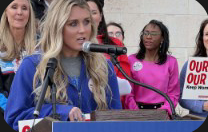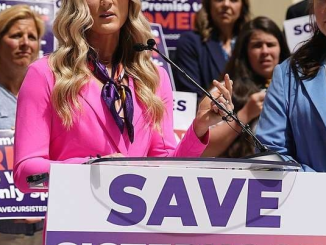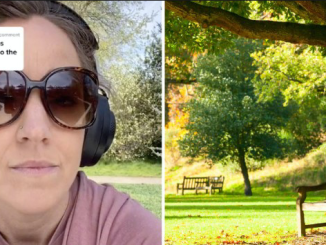
Current and former female scholastic athletes warned Thursday that they will sue the NCAA unless the association eliminates its policies allowing male-born students who identify as female to compete in women’s sports.
Marshi Smith, former University of Arizona swimming champion, read a letter during a breezy Thursday press conference outside the NCAA annual convention in San Antonio urging the organization to “take direct and immediate action to establish rules to keep women’s collegiate sports female.”
“We’re here and we’re not going to stop speaking and advocating until we know women’s sports have rules in place that defend integrity and fairness for female athletes,” said Smith, co-founder of the Independent Council on Women’s Sports [ICONS].
The demands include repealing policies that “allow male athletes to take roster spots on women’s teams and/or compete in women’s events”; establishing rules to “keep women’s sports female,” and requiring colleges to provide single-sex female locker rooms.
“If you do not protect female athletes from discrimination on the basis of sex, we will embark on legal action to compel you to do so,” said the Thursday letter from attorneys for the Jackson Bone law firm on behalf of ICONS and eight other women’s organizations.
They are the Women’s Liberation Front, Women’s Declaration International USA, Independent Women’s Forum, Alliance Defending Freedom, Concerned Women of America, Champion Women, International Consortium on Female Sport, and the Women’s Sports Policy Working Group.
The rally headlined by former University of Kentucky swimming champion Riley Gaines featured nearly two dozen female athletes ranging from former collegiate players and coaches to Olympians like three-time gold medalist Nancy Hogshead-Makar, CEO of Champion Women.
Several of the speakers were spurred into action by former University of Pennsylvania swimmer Lia Thomas, who became last year the first male-born athlete to win an NCAA women’s title after transitioning to female following three years on the men’s team.
They include Gaines, who began speaking out after tying with Thomas for fifth place in the 200-yard freestyle at the 2022 NCAA women’s swimming championships. The official at the scene gave Thomas the trophy to hold for photos and promised to send another one to Gaines.
“This isn’t just about me,” said Gaines, a 12-time All American now working with the Independent Women’s Forum. “I’m speaking for those people who can’t handle being called transphobic or can’t handle being called hateful or a bigot, or all of those things which aren’t true, because in reality you’re just asking for the bare minimum and standing up for yourself.”
The NCAA reworked its transgender policy last year amid the Thomas flap, dropping its testosterone requirement for male-born athletes and opting instead to defer to the national governing bodies for individual sports.
Passing the buck to other organizations isn’t enough, said Christiana Kiefer, Alliance Defending Freedom senior counsel, who won a federal decision last week upholding West Virginia’s law requiring scholastic athletes to compete based on their sex at birth.
“The NCAA should be leading the way to restore fairness and a level playing field to women’s sports, and that means no men in the women’s category,” she said. “It’s time to bring the NCAA into compliance with federal law, principles of fairness, and simple biology.”
The NCAA said that its sport-by-sport approach “preserves opportunity for transgender student-athletes while balancing fairness, inclusion and safety for all who compete.”
Eighteen states have passed legislation barring biological males from female sports, and more laws may be coming.
Texas state Rep. Valoree Swanson, a Republican, introduced in October the Save Women’s Sports Act, a bill barring male-born athletes from collegiate female sports that builds on the 2021 Save Girls’ Sports Act, which covered scholastic athletics in grades 7-12.
Idaho state Rep. Barbara Ehardt, who sponsored the first such bill in 2020, called the turnout at Thursday’s rally “awesome,” recalling how the hearings for her legislation were lopsided with opponents.
“When we brought that legislation, I am telling you, no one was there to testify with us,” said the Idaho Republican. “For two days, the hearings were packed with the other side, and then me and maybe two other people. That’s it.”
A former Division I basketball player and coach, Ehardt pointed out that the 18 states with Save Women’s Sports and Fairness in Women’s Sports laws overlap significantly with the Power Five athletic conferences.
“The NCAA needs to come to the table and talk with us because they no longer have the power and authority that they think they have when the states are saying no,” she said.
A petition led by the Independent Women’s Forum telling the NCAA to “stop discriminating against women” has gathered nearly 8,000 signatures.
* Article from: The Washington Times


